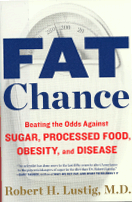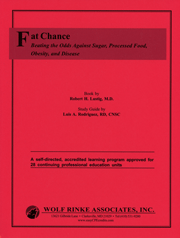|
Fat Chance:
Beating the Odds Against Sugar, Processed Food, Obesity, and Disease
Book by Robert H. Lustig, M.D.
Study Guide by Luis A. Rodriguez, RD, CNSC
C245 |
28 CPEUs |
HARD COPY |
DISCONTINUED |
|
Book, 320 pgs and study guide with 1 reporting form, 38 pgs.
Ground breaking book documents the science and politics that have led to the pandemic of obesity and disease, and proves that "a calorie is not a calorie." Tells you how to readjust your patient's key hormones to regulate their hunger, reward and stress, so that they can lose weight permanently and recover their health.
For more information and customer comments, click
here.
Approved/Accepted by CDR, CBDM, NCBDE
For RDs/RDNs & DTRs/NDTRs for the Professional Development
Portfolio
SUGGESTED Learning Need Codes:
2000, 2020, 2050, 2070, 2090, 2100, 2110, 3000, 3005, 3010, 3020, 3030, 3040, 3060, 3070, 3080, 3090, 3100, 4000, 4010, 4020, 4030, 4040, 4050, 4060, 4070, 4080, 4090, 4100, 4110, 4120, 4150, 4160, 5000, 5130, 5150, 5160, 5180, 5190, 5200, 5240, 5260, 5280, 5290, 5300, 5320, 5350, 5370, 5460, 6010, 8018, 9020
SUGGESTED Performance Indicators (PIs):
3.3.5, 6.3.11, 8.1.1, 8.1.3, 8.1.4, 8.1.5, 8.3.1, 8.3.6, 8.4.1, 9.6.1, 10.2.1, 10.2.5, 10.4.1, 10.4.2, 12.1.1, 12.3.1, 13.2.1
DON'T SEE your Performance Indicators or Code Listed here?
There are many Performance Indicators (PIs) that are applicable we can't list them all &
Per CDR you may use ANY PI or CODE as long as it relates to your Learning Plan.
For details click here.
Share with a friend and Save! Click here for important information about
sharing.
To order an ADDITIONAL Reporting Form click below:
Fat Chance: Beating the Odds Against Sugar,
Processed Food, Obesity, and Disease
Book by Robert H. Lustig, M.D.
Study Guide by Luis A. Rodriguez, RD, CNSC
© 2013 Wolf Rinke Associates. All rights reserved for this
self-directed accredited learning program. Reproduction in whole or
part without written permission, except for brief excerpts, is prohibited.
CUSTOMER COMMENTS
Laura Filippelli: "The book was a pleasure to read , as the author easily explained concepts related to obesity and the role our current diets play. The Case Studies were realistic and timely."
Nicole Porter: "First, I love the information provided in this book. This book was very informative. Also, I love the study book provided. The explanation of the answers was very helpful. Thank you, this program is amazing and I will continue to order from Wolf Rinke."
Tricia Neura: "I really liked how there were case studies that helped you apply the knowledge that you learned. This was a great read and I intend on incorporating some of these principles into my 200-level nutrition class that I teach at a University."
Josephine Lamakina: "The questions consider the content of the book but also provided real life examples of clinical situations. Excellent course, good questions, and a nice plus to have explanations to answers."
OVERVIEW AND INSTRUCTIONS
Welcome to the pre-approved, accredited CPE self-study program for Fat Chance: Beating the Odds Against Sugar, Processed Food, Obesity, and Disease. The program consists of a book of the same title by Robert H. Lustig, M.D. and this study guide. The CPE program is designed to help you understand the relationship between sugar, processed foods, obesity and metabolic disease, and the proposed ideas to help combat and reduce metabolic disease. It is also designed to help you earn 28 Level 2, Continuing Professional Education Units (CPEUs).
To get the most out of this CPE program, it is suggested that you adhere to the following four steps:
- Review the objectives in this study guide.
- Read and study the book.
- Assess what you have learned by answering the self-assessment questions in this study guide.
- Compare your answers to the answer key, which you will find at the end of the study guide. If you scored at least 80% (60 questions) correct, you have completed the program and are ready to transfer your answers to the CONTINUING PROFESSIONAL EDUCATION REPORTING FORM in front of this study guide. If you scored less than 80% correct, re-read the appropriate sections of the book and until you score at least 80% correct.
After you have successfully completed the program, complete the CPE REPORTING FORM and:
Submit on-line atwww.easyCPEcredits.com.
Or fax to: (410) 531-9282,
Or mail to: Wolf Rinke Associates, 3801 Schuylkill Road, Spring City, PA 19475
We will email your Certificate of Completion.
When you submit your CPE Reporting Form to us via mail, fax or www.easyCPEcredits.com, be sure to write your correct email address in the space provided on the CPE Reporting Form. If writing by hand, be sure to print your email address clearly.
To ensure that our emails are delivered to your inbox (instead of your junk/spam folders), please add cpesupport@wolfrinke.com to your Address Book or Safe List of allowed email senders. Also, be sure to allow attachments from this email address.
GOAL
This CPE program will enable you to understand the relationship between sugar, processed foods, obesity so that you can help your patients combat and reduce metabolic disease.
OBJECTIVES
Upon completion of this accredited, self-directed learning program you will be able to:
- Evaluate the relationship between genetics and the obesity epidemic;
- Explain to your clients/patients the environmental changes that are contributing to the obesity epidemic;
- Identify metabolic dysfunction and syndrome and its prevalence in the normal weight and obese populations;
- Explain to clients/patients the inaccuracy of applying the first law of thermodynamics to their own energy balance;
- Recognize the inaccuracy of the dogma that "A Calorie is A Calorie" when achieving optimal health;
- Empower your clients/patients by helping them understand the limitations of personal responsibility in achieving weight loss and optimal health;
- Help your clients/patients understand the metabolic and weight effects caused by hyperinsulinemia;
- Evaluate the effects of exercise on weight status and health;
- Recommend an appropriate exercise regimen to your pediatric patients/clients to achieve optimal health;
- Explain to your clients/patients the role of dietary fiber in nutrient absorption and metabolism, and insulin regulation;
- Assist your clients/patients in increasing their dietary fiber intake;
- Explain to your clients/patients the effects of sugar intake on fatty liver development and T2D;
- Evaluate the relationship between specific micronutrient serum levels, such as vitamin D and tocopherols, and optimal metabolic health;
- Communicate to your patients/clients the importance of eating regular meals;
- Assist your clients/patients in improving their home environment to support healthy living;
- Evaluate total cholesterol and metabolic panel to assess health status;
- Modify your patients/clients dietary intakes based on their metabolic status;
- Provide recommendations on antioxidant supplements;
- Recognize the uniqueness of fructose metabolism and its health implications;
- Discuss the societal and metabolic similarities between fructose and alcohol;
- Assess how genetics and epigenetics play a role in metabolic health and obesity;
- Explain the relationship between stress hormones and metabolic health;
- Suggest methods for stress-management;
- Explain the biochemical differences between caloric and non-sweeteners and their use in beverages;
- Provide guidelines for healthy shopping;
- Help patients/clients recognize the differences between successful diets and their possible benefits;
- Recognize the limitations of healthy diet modifications on some patients/clients and the alternatives for weight management and health improvement.
TABLE OF CONTENTS
Introduction: Time to Think Outside the Box
I. The Greatest Story Ever Sold
1. A Fallacy of Biblical Proportion
2. A Calorie Is a Calorie--or Is It?
3. Personal Responsibility versus the Obese Six-Month-Old
II. To Eat or Not to Eat? That's Not the Question
4. Gluttony and Sloth--Behaviors Driven by Hormones
5. Food Addiction--Fact or Fallacy
6. Stress and "Comfort Food"
III. "Chewing" the Fat
7. The Birth, Care, and Feeding of a Fat Cell
8. The Difference Between "Fat" and "Sick"
9. Metabolic Syndrome: The New Scourge
IV. The "Real" Toxic Environment
10. The Omnivore's Curse: Low Fat versus Low Garb
11. Fructose--The "Toxin"
12. Fiber--Half the Antidote
13. Exercise--The Other Half of the Antidote
14. Micronutrients: Home Run or Hyperbole?
15. Environmental "Obesogens"
16. The "Empire" Strikes Back: Response of the Food Industry
V. The Personal Solution
17. Altering Your Food Environment
18. Altering Your Hormonal Environment
19. Last Resorts: When Altering Your Environment Isn't Enough
VI. The Public Health Solution
20. The "Nanny State": Personal versus Societal Responsibility
21. What Hath Government Wrought?
22. A Call for Global Sugar Reduction
Epilogue: Not a Top-Down but a Bottom-Up Movement
Acknowledgments Notes Glossary Index
ABOUT THE AUTHOR OF THE BOOK
Robert H. Lustig, M.D., a pediatric endocrinologist at UCSF Benioff Children's Hospital, is nationally recognized in the field of neuroendocrinology, with an emphasis on the regulation of energy balance by the central nervous system. He is interested in how biochemical, neural, hormonal and genetic influences contribute to obesity in children and adults. He defined a syndrome of vagally mediated beta-cell hyperactivity that leads to excessive production of insulin and obesity, which may occur in up to 20 percent of the obese population and is treatable with insulin suppression. He also is studying the association between hyperinsulinemia, or the presence of excess insulin in the blood, and cardiovascular disease and is developing methods to evaluate and prevent this in children.
Lustig earned a bachelor's degree from the Massachusetts Institute of Technology (MIT) and a medical degree from Cornell University Medical College. He completed a pediatric residency at St. Louis Children's Hospital and a clinical fellowship in pediatric endocrinology at UCSF. From there, he spent six years as a postdoctoral fellow in neuroendocrinology at Rockefeller University in New York. Lustig is the director of the Weight Assessment for Teen and Child Health (WATCH) Program at UCSF Benioff Children's Hospital; a member of the UCSF Center for Obesity Assessment, Study, and Treatment; as well as a member of the Obesity Task Force of the Endocrine Society. Lustig is a professor of clinical pediatrics in the Division of Endocrinology at UCSF.
ABOUT THE AUTHOR OF THE STUDY GUIDE
Luis A. Rodriguez, RD, CNSC is a pediatric clinical dietitian at UCSF Benioff Children's Hospital and a nutritionist at the WATCH (Weight Assessment for Teen and Child Health) clinic. Along with Dr. Robert Lustig, he provides nutrition education and counseling to overweight children, teenagers, and their families. He is interested in the prevention and treatment of metabolic disease in children, such as type 2 diabetes, hypertension and fatty liver disease.
Rodriguez earned a Bachelor of Science degree in Nutritional Sciences at the University of California, Berkeley; there he conducted pediatric obesity research at the Atkins Center for Weight and Health under Sharon Fleming, PhD, and Patricia Crawford, DrPH, RD. Rodriguez completed his dietetic internship program at the University of California, San Francisco Medical Center. He is a registered dietitian/nutritionist, has a certification for nutrition support clinician, and is a member of the Academy of Nutrition and Dietetics, where he is the pediatric newsletter section editor of Weight Management Matters.
Rodriguez will begin working towards earning a doctorate degree in public health at the University of California, Berkeley in the fall of 2013. Return to the top of page
If you prefer to order by phone, mail
or fax click below
or click here to contact us with
other questions.
For information about our other products and
services return to the sidebar at the top of the page.
|
|
|


